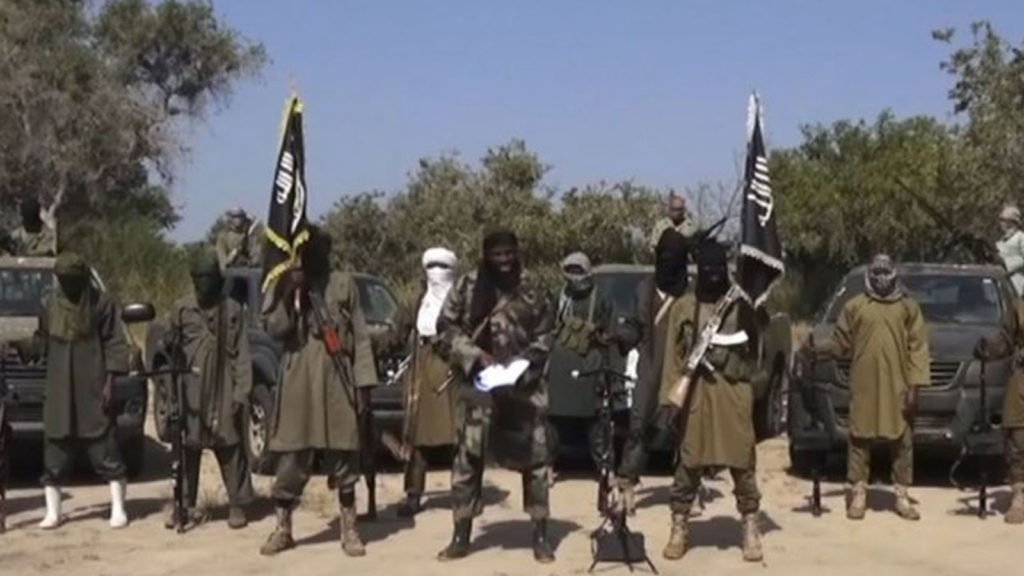One soldier was killed and 20 others wounded Saturday in a Boko Haram attack in Maiduguri the northeast, just hours before voting began in Nigeria’s presidential election, security sources said.
A civilian militia source in Borno state capital Maiduguri told AFP “at least 13” blasts were heard throughout the city at dawn, around two hours before voting opened at 8 a.m.
Residents also reported hearing the explosions.
“Boko Haram terrorists attempted to enter the city but were intercepted,” a security source told AFP.
“They resorted to firing RPGs [rocket-propelled grenades] on the city. Attempts have been made to locate the source of the firing.”
A second source said one of the explosions occurred at the headquarters of the Nigerian Army 7th Division as troops were preparing to go out on operations.
“One soldier was killed and 20 were injured. There were other explosions at Maimalari barracks but there was no casualty,” he added.
A fighter jet was seen flying over the city, and the source said troops were searching for the source of the fire.
Three shells fell into an open rice field in the Teachers Village camp for people displaced by the conflict but there were no immediate reports of casualties. Images from the area appeared to show an unexploded Grad rocket.
But the army denied there had been any attack on “Maiduguri township or its neighboring communities,” saying “Borno State especially Maiduguri township is calm and peaceful.”
Borno state police commissioner Damien Chukwu acknowledged the sound of gunfire but said it was “for security purposes,” insisting there was “no threat to public peace and order.”
Director of Army Public Relations Colonel Sagir Musa tweeted that the “gun fire was not targeted at members of the public but was for security calculations.”
Islamic State claims Grad rocket attacks
In a statement, Islamic State claimed fighters from its West Africa province affiliate fired five Grad rockets at Maiduguri airport, two at Nigerian army positions and three at another location that is unclear.
Boko Haram split into two factions in mid-2016. One is led by Abu Mus’ab Al-Barnawi and largely focuses on attacking military and government targets, while the other, led by Shekau, is notorious for suicide bombings and indiscriminate killings of civilians.
Shekau pledged allegiance to ISIS leader Abu Bakr Al-Baghdadi, but ISIS central only gives formal backing to the Barnawi faction, which is known as Islamic State West Africa province.
At about the same time as Maiduguri was attacked, insurgents also moved on Geidam, north of the Yobe state capital Damaturu, but were repelled by troops who were alerted by locals, security sources said.
Musa acknowledged what he called a “futile attack on a security outpost in Geidam general area,” saying that no casualties were recorded and the situation was calm.
It was unclear which faction attacked the town, but a military base in Geidam was attacked by ISWA fighters on January 23.
Elsewhere in Borno, Boko Haram fired rockets at the town of Gwoza, injuring three people and partially damaging a mosque, AFP reported.
In recent weeks the wider Gwoza area has seen a number of attacks, all blamed on Shekau’s faction. On January 30, Nigerian troops “neutralized” five Boko Haram insurgents and captured a suspected militant in the Gwoza area.
There were also clashes in Auno and Goniri, on both sides of the border between Borno and Yobe, and an attack late on Friday on Zabarmari village, 10 km (six miles) outside Maiduguri, AFP reported.
Voters were on Saturday casting their ballots in Nigeria’s presidential election, with incumbent Muhammadu Buhari, a former army general who has vowed to defeat the jihadists, seeking a second term in office.
Boko Haram’s bloody insurgency began in northeastern Nigeria in 2009 but has since spread into neighboring Niger, Chad and Cameroon, prompting a regional military response. Some 27,000 people have been killed and two million others displaced, sparking a dire humanitarian crisis in the region.
Both factions of Boko Haram have intensified attacks in the region over several months, but the upsurge in ISWA attacks has been much more serious. Amid signs of a takeover by more hardline leaders, the group has launched dozens of assaults on military targets in Borno and Yobe states in Nigeria.
In the Borno town of Gamboru, on the border with Cameroon, Chadian troops in about 50 vehicles, including tanks, arrived at about 11:30 am on Saturday, while voting was in progress.
The Chadians are part of the regional Multinational Joint Task Force fighting Boko Haram. N’Djamena said on Friday night it had deployed more than 500 soldiers to support their Nigerian counterparts.
With reporting from AFP



